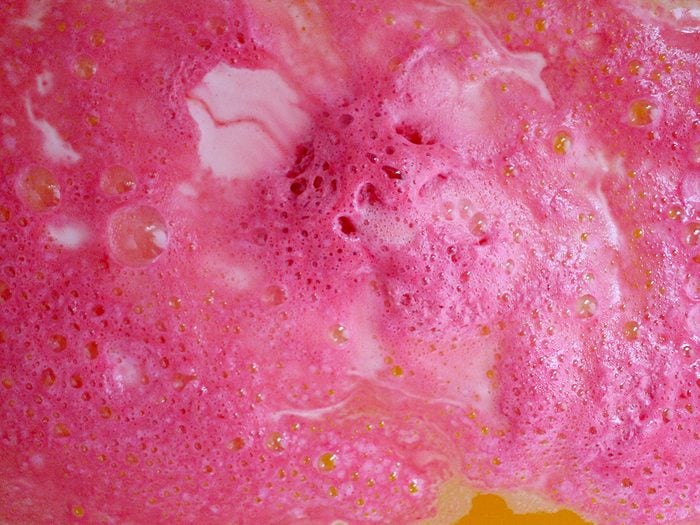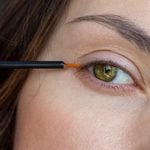Are Your Bath Products Bad for Your Vag?

Here’s what you need to know about maintaining good vaginal health if you love a good soak in the tub.
In the early days of the pandemic, I was doing the same thing as many other women who were advised to stay home: taking long, frequent baths to hide from my family. These soaks were luxurious nightly escapes that usually involved a scented bath bomb, the kind that leaves your tub shimmering with glitter for days. It was the perfect way to relax—until I found myself with a UTI and the bad news that my beloved, sanity-saving bath routine was likely the cause.
If you’re experiencing any discomfort down there and are wondering if your bath products are to blame, here’s what you need to know.
Are bath bombs and other bath products bad for your vagina?
Generally speaking, if you’re using products made without harsh chemicals, and your baths aren’t too hot or too frequent, they should be safe.
Jen Gunter, a Canadian OB-GYN who wrote The Vagina Bible, says you won’t get a UTI or yeast infection from your favourite bath bubbles, but they could “absolutely cause vulvar irritation, and that may be mistaken for a yeast infection,” she says. This irritation may show up in the form of redness, itching or general discomfort.
The solution? Choose products with natural ingredients. “Bath products made with natural colourants and ingredients should not be irritating to most people,” says Jennifer Blake, a clinical professor of obstetrics and biology at McMaster University in Hamilton. Some people with sensitive skin may notice irritation after using a specific product or ingredient—if this is the case, you should simply discontinue use.
However, spending hours in the tub can cause irritation no matter which products you’re using, says Blake. A too-long, too-hot bath can upset the microbiome in your vagina and lead to dryness, she says, which in turn may cause thinning of the delicate vulvar tissue. This removes some of the natural protection your body has against infections—which is likely how I got my UTI. I now take shorter, slightly cooler baths and am able to use my favourite glittery bath bombs without paying for them later.
Should you only use bath products made of natural ingredients?
Bath products with natural ingredients like sodium bicarbonate and citric acid (commonly found in bath bombs) can still impact your vagina’s pH level if you soak for longer than recommended, says Blake. This disruption in pH can make you more susceptible to an infection from common sources. For example, when bacteria that normally lives in the large intestine travels to the vagina after a bowel movement, it can cause a UTI (this is why women are advised to always wipe front to back). A vagina with a lower or higher pH isn’t as capable of fighting off that bacteria to prevent a UTI from occurring. So, that hour-long soak in a hot bath may wash your troubles away but for your vagina, it can actually cause more harm than good. Stick to 15-20 minutes in the tub—most experts agree this won’t mess with your pH.
Gunter adds that while some bath products promote themselves as “healthy” for the vulva or vagina, there is no scientific evidence to back that up. Simply put, a bath bomb may be well-tolerated by one person and cause irritation in another—but it’s never going to make your vagina “healthier.”
Are some people more susceptible to vaginal health issues than others?
When you’re in menopause or if you’re breastfeeding, you’re more likely to experience thinning tissue and dryness. This is due to a drop in estrogen levels, which means you’re more vulnerable to infection, says Blake. But that doesn’t mean you can’t take a bath—you just need to be extra cautious by taking fewer, shorter and cooler soaks in the tub.
Menopausal or not, pay attention to what’s in your bath products and stop using anything that leads to discomfort. “If you’re one of those more sensitive people, you’ll know very quickly because you’ll have irritation, usually where the tissue is thinner, such as around the vulva,” says Blake.
So, can I still have my nightly soak?
Despite these cautions, a bath still comes recommended by the pros. “A good bath is a wonderful way of relaxing, and it’s one of those times when women can shut the door and enjoy a little bit of quiet time,” says Blake. She recommends avoiding any discomfort by simply being aware of what’s in your bath products, and avoiding too many chemicals.
Gunter recommends monitoring your physical reactions to various products. “It is really [about] trial and error,” she says. But of course, if one bath product irritates you, let your vag recover before trying out a new one.
Blake’s tips for the tub:
- Rinse out your tub with the shower head before drawing a bath—this will help get rid of any dirt or lingering cleaning products
- Take shorter, less hot baths to avoid upsetting your microbiome or causing damage to your vulva
- Look for natural ingredients (sodium bicarbonate and citric acid, for example) in your bath products and avoid harsh chemicals or ingredients you’re unfamiliar with
- If a bath product causes vaginal irritation, stop using it—what irritates one person won’t irritate another, so it’s best to keep track of the ingredients you’re sensitive to
- Be extra cautious if you’re breastfeeding or in menopause, and avoid too-hot baths entirely if you’re pregnant
Next: 6 Bath Products That’ll Help You Escape Reality and Relax




